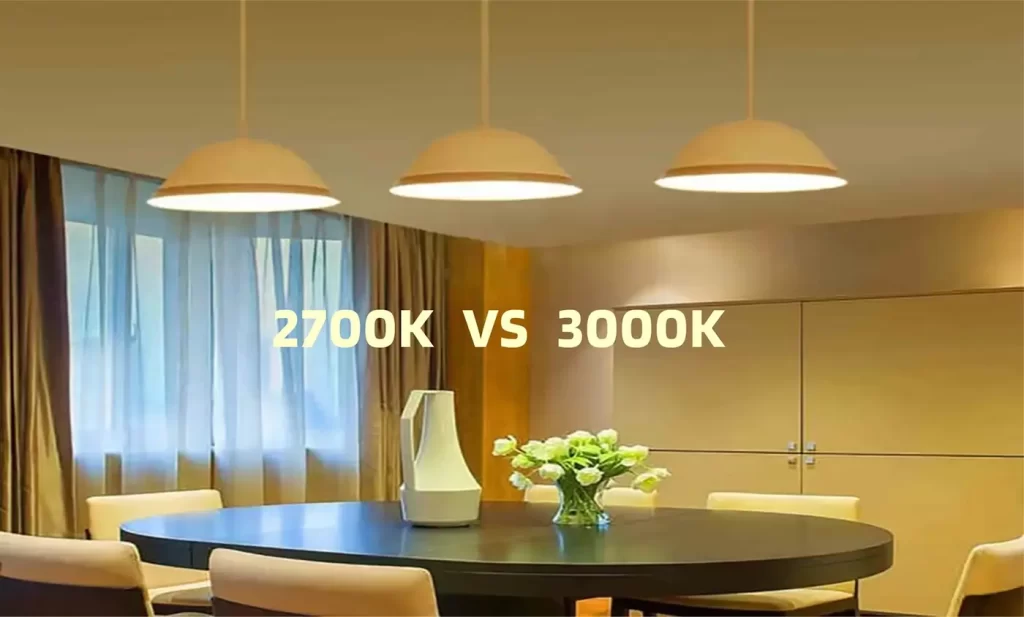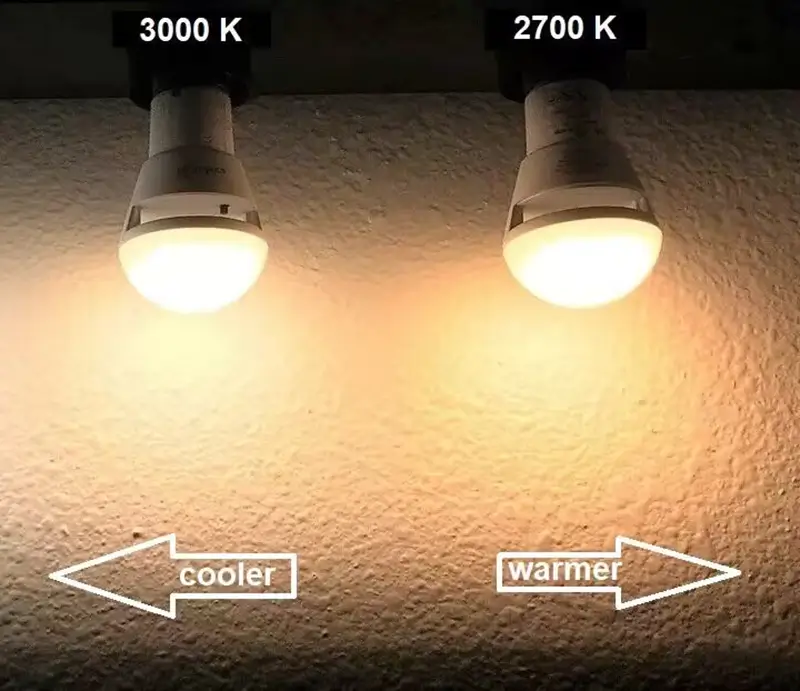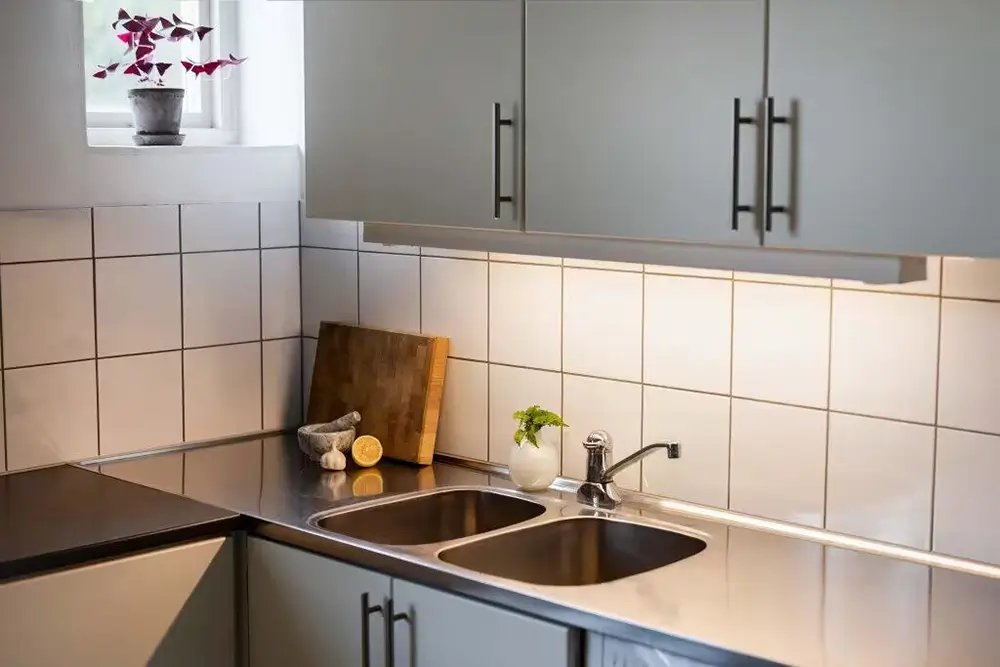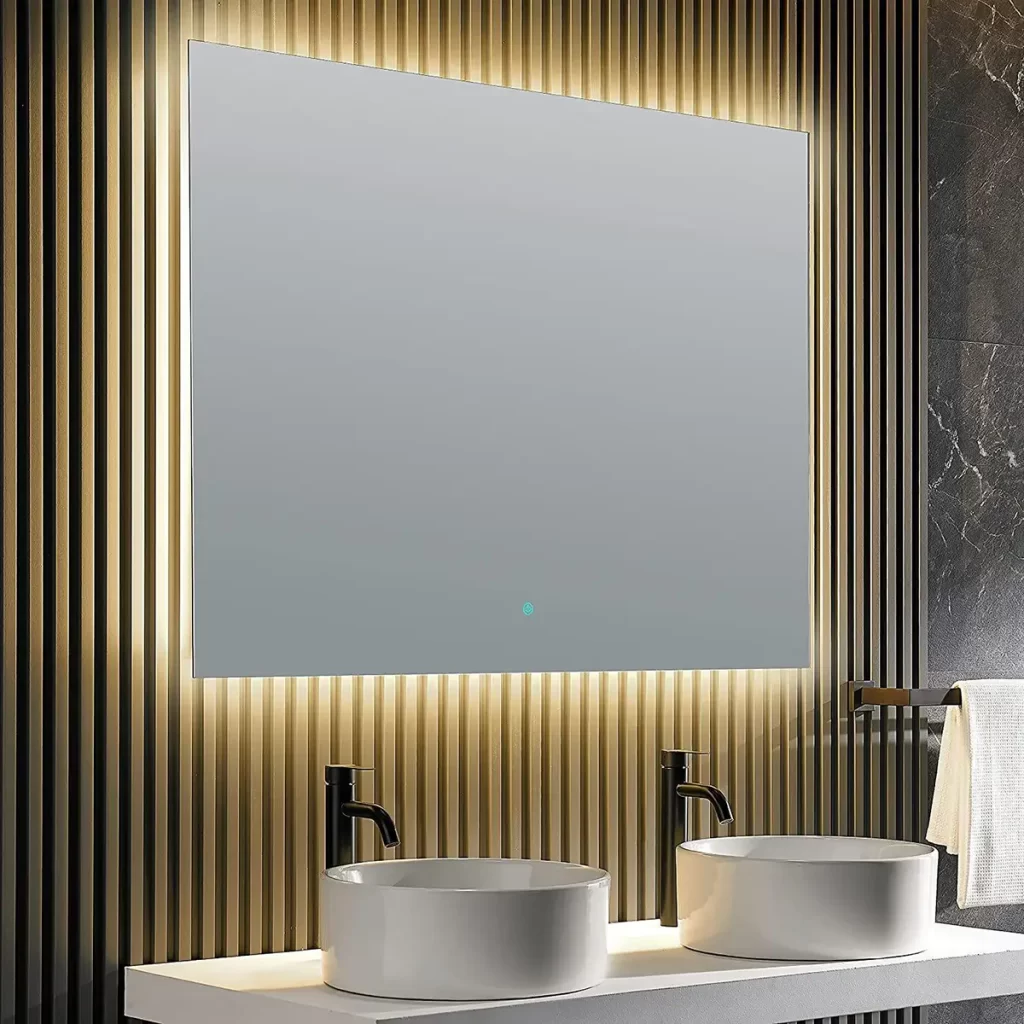
When looking for LED lighting products for your home, you’ll often come across options with color temperatures between 2700K vs 3000K. Even though both are often considered “warm white”, there are noticeable color differences between the two-color temperatures.
First, you need to clearly understand what color temperature is. So, it’s a way of describing the relative warmth or coolness of different colors of white light. The unit of color temperature is Kelvin. Varies from 1,000 to 10,000. The higher the Kelvin rating, the brighter the light from the light source.
In this article, however, we focus on the difference between 2700K vs 3000K white light color, and the best choice for the color temperature of your home.
2700K Color Temperature
Wondering what 2700K color temperature means. First, we think of incandescent lamps. The number on the Kelvin scale indicates the temperature of the filament in an incandescent bulb, if the filament reaches a temperature of 2700 Kelvin while giving off as bright light as possible, the bulb has a color temperature of 2700K, so a 2700k bulb has the same color temperature as an incandescent (traditional) bulb.
Most incandescent lights now emit 2700K light, if you like this color of light, you can choose 2700K white light. This means that if you want to create an ambiance or environment that encourages tranquility, you should really consider a 2700k bulb.
3000K Color Temperature
3000K light looks slightly purer than 2700K light. Its color is neutral white. It has fewer shades of yellow or orange, and we have a cleaner look. If you’re familiar with halogen bulbs, the color of light they emit is 3000K.
If you don’t like the color of incandescent bulbs, or want a little sharper color, then 3000K bulbs are the best choice for you. The whites of the 3000K lighting aren’t too cold, too harsh, or too blue. It has a warm white color temperature.
What is the difference between 2700K vs 3000K?

If you compare the difference between a 2700K and a 3000K bulb with just your eyes, you just have to look at the two bulbs side by side, it’s easy to see the difference. But if you separate them, for example, we light up 270OK and 3000K in different rooms, you can hardly see the difference.
If you put 2700K and 3000K lights in one place, they can blend well in the same space. So, if you’re using 2700K ambient lighting in the kitchen, you’re using 3000K lights in the same area as under-cabinet or countertop lights. That would look nice too.
Another difference is the amount of blue light contained. Blue light is said to suppress the production of melatonin, the hormone responsible for our sleep and relaxation. If exposed to blue light for a long time, it will affect the quality of sleep. The amount of blue light in a 3000K bulb is higher than that in a 2700K bulb. But the difference is not big, it can be said to be very slight.
When to use 2700K Warm White
The 2700K lights have a yellow tint which makes things look cozier and more natural. We recommend these color temperatures for the following activities or tasks.
Enhance materials with natural toners like wood or fabric.
Dining room.
lounge
bedroom
Living space.
Read a book, and the warm lighting lifts the mood.
Relax or watch TV.
When to Use 3000K Soft White
White light with a color temperature of 3000K is now popular. The heat that interacts with the light produces a crisper, slightly whiter light with cooler tones, making the light appear more realistic. Typically, 3000K lights are suitable for the following locations in your home:
bathroom
Dining room.
office
kitchen
Materials that reflect cool-colored surfaces, such as glass and tile.
hotel lobby.
Normal ambient light for cleaning.
Which Colour Temperature Suits Your Home?
If you want to maintain a cozy environment around your house, you should choose lamps with warm colors. Both 2700K and 3000K lights are known as warm white lights and are highly compatible with earth tones and wood furniture.
There is a slight difference between 2700K vs 3000K. However, 3000K lights are suitable for active areas such as home offices, hallways, bathrooms, and kitchens, while 2700K lights are suitable for sites associated with warmth and relaxation, such as living rooms, dining rooms, and bedrooms.
2700K vs 3000K for Kitchens

Neutral light for the kitchen is most suitable for spaces that provide practical functions, so the preferred temperature is 3000K, which is a good place to integrate two color temperature lights. Because it flatters the complexion, is attractive, yet is mission-oriented. It is best to consider the purpose of the room when choosing lamps. The kitchen is used every day, so it is best to choose neutral lighting.
2700K vs 3000K for Living Rooms
When choosing the color temperature of living room lights, consider the effect you want. The 2700K white light makes the living room warmer, it is the place where you relax at home after tiring work. It enhances enjoying family time. 3000K white light or cool white light is better for activities like reading or watching TV. Cooler tones will also allow you to see your surroundings clearly.
2700K vs 3000K for Bathrooms

In the bathroom, 3000K light will be more realistic and clearer, while 2700K light will make things more comfortable and natural, allowing you to enjoy a relaxing bath. The 2700K lights produce orange and yellow tones, and if you just want to create a warm, cozy ambiance without regard to lighting, the 2700K is a good choice.
2700K vs 3000K for Bedrooms
Bedrooms are for relaxing and sleeping, first, we have to consider another blue light factor, 2700K lamps produce less blue light than 3000K lamps. Alternatively, if you want a slightly warmer look, you can go for 2700K, but if you want a more versatile soft white, go for 3000K color temperature.
Consider using a Color Rendering Index

When choosing between color temperatures, there is one more important factor we need to consider, and that is the CRI or Color Rendering Index.
You may ask why? CRI is a score with a maximum value of 100 and is a measure of how a color looks under a light source versus sunlight. Makes the light’s CRI generally between 0 and 100. This means that the closer a light source’s CRI is to 100, the more it will mimic the effect of a natural light source
How to choose the Right CRI for 2700K vs 3000K?
Ideally, you want a CRI of 90-92 or higher. 2700K or 3000K color temperature is available for various CRI values. In fact, it is enough for you to choose CRI90+.
All in all
2700K is warm and 3000K is slightly cooler, both are classed as warm whites.
2700K lights are good for when you want to relax your occupants and 3000K is perfect if the main focus of space is concentration or activity.
The color temperature of your lighting should be chosen based on your personal preferences, as well as the feel and atmosphere you want to create in your space.
FAQs
2700K is the warmer of the two. On the Kelvin scale, 2700K will feature more yellow or red tones while 3000K will feature slightly whiter hues.
2700 Kelvin is warm. The catering and hospitality sectors often use this color temperature, sometimes known as “very warm white,” for ambient lighting.
If you want relaxing living rooms and bedrooms, the 2700K creates a truly beautiful, warm ambiance and is a perfect choice.
While 3000k bulbs provide a brighter, whiter light, the 2700k range produces a warmer, more golden light.
The cleaner and crisper 3000k light are best for areas where you need to be productive and maintain high energy. As a result, areas such as kitchens, home offices, study rooms, etc., would be best suited with a 3000k light.
From all the information given in the article when we say the difference between 2700k vs 3000k lights, it all comes down to your personal choices and preferences. 2700k lights are better for relaxation and 3000k lights are best for productive environments. However, you should also consider the colors in your surroundings, as the lights should blend well with these.
